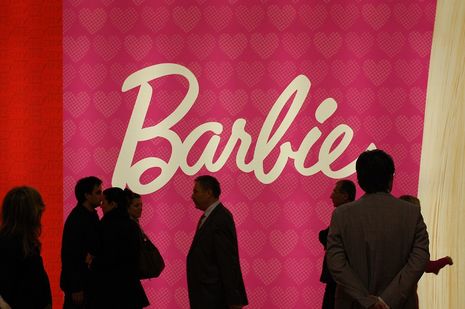Please, dear God, no more ‘buy’opics
Cathryn Kirk is dreading this tidal wave of ‘buy’opics and, frankly, it’s making her a (t)ad nauseous

We all saw Barbie this summer. Maybe you’ve heard about the upcoming Uno film, too. These ‘buy’opics beg the question: how much cultural presence does a product need to merit a movie? The answer, judging by the rise of corporate portraits such as Air and Tetris, is not a lot. It seems that now, with an entertaining-enough-plot, you can advertise whatever you like over a ninety-minute runtime. Board games, card games, video games – there’s a film about Cheetos on Disney+. Brands have realised they can’t beat TV, and so they’ve joined it. Product placement and adverts just aren’t enough anymore. Why not sell you their company ethos, the gutsy story of a billion-dollar underdog? The rise of product-central films blurs the line between advertisement and entertainment and threatens to leave cinema bereft of any heartfelt stories. Now Mattel gets to say they’re feminists. Worse, people believe them.
"Hopefully advertising will stay where it belongs: before the movie starts"
How the hell did we get here? The Social Network is generally held as the exemplar, but it stands taller than its most recent rip-offs. Fincher isn’t trying to sell you Facebook, he’s telling you the story behind it. In the words of the writer, it’s so great because it has nothing to do with Facebook. Further back in 1985 there’s Clue, a comedy-mystery based on Cluedo. Perhaps its owners stood to gain, but the film is more light entertainment than hard sell. It’s not full of marketing opportunities like The Lego Movie or Barbie. Today’s thinly-disguised adverts more closely resemble the grim world of kids’ television in 80s America. Back then advertising had just been deregulated, and shows like The Transformers put the nag effect into full power. Look at these cool toys, doing cool things: don’t you want your parents to buy them for you? Imagine that ethos plus tens of millions of dollars. If you’re finding it difficult, take a couple of hours to watch Air.

It’s a fine example of the latest bout of product-central films, and here you’re sitting through 112 minutes of Nike mythmaking. Nostalgia’s out in full force. The 80s are rammed down your throat so much you’ll be heaving up He-Man toys by the end. The stakes are drastic: will this 900-million-dollar company get any richer? You’ll be on the edge of your seat learning how Nike cares for its clients. By the end of it you’ll realise how great they are as a company, and how cool those Air Jordans are! It’s watchable, even funny in parts, but the undercurrent of advertising sours the whole endeavour. The purpose of the film isn’t to make you feel anything; it’s to make Nike look good. The same goes for Tetris, out this year, which details how the game’s rights were secured from the USSR. Now people can claim Nintendo is cool — did you see that car chase scene? People are given a story to attach to companies that don’t care about them. You identify with the guys at Nike, you want Tetris to make it to America, you think the 80s were so cool. And those retro Jordans are only £190…
"Today’s thinly-disguised adverts more closely resemble the grim world of kids’ television in 80s America"
Product-central films are not here to entertain you or engage you in sincere stories; those are only means to an exploitative end. This crop of long-form adverts paints Shoe Dogs as underdogs, making us emotionally invested in a product’s sales and a company’s wealth. It can be a compelling story. It could result in some great films. But when the company is still active, the stakes are hollow and the advertising obvious. Corporate biopics are feeding us the same story of plucky adventure capitalists, regardless of whether they’re taking crazy gambles on Michael Jordan or getting the better of the backwards USSR with a computer game. It doesn’t matter how true the stakes are, as long as we’re convinced these companies take risks to give back.
Flamin’ Hot, out this year, tells the story of a Mexican-American janitor at Frito-Lays whose heritage inspires the eponymous Cheetos. It’s not true, and we shouldn’t care. We’re led to believe that Cheetos does social good. I’m sure it’ll be the touching story of Nestlé’s child philanthropy in West Africa next. Why not turn that Pepsi ad into something longer? Kendall Jenner has potential as our next Jane Fonda, starring in another empty feel-good yawn about ironing boards or toothpaste.
Thankfully, it’s not yet a dirge on cinema. Companies have only a fraction of the appeal people do, so we might not see product-focused films rivaling the biopic boom. We’ve had Spotify, Apple, Facebook, and we’re already scraping the barrel with Beanie Babies and Cheetos. Hopefully advertising will stay where it belongs: before the movie starts. If anything, companies risk asininity by churning out the same stories about themselves. We’ll be stuck with the kind of naked absurdity Wayne’s World poked fun at in its product placement bit: “It’s like people only do things because they get paid.” The veneer of entertainment will be stripped back to reveal blatant advertisement. That’s why I for one am dreading an onslaught of product-focused films. Call that ad nauseum.
 Interviews / Lord Leggatt on becoming a Supreme Court Justice21 January 2026
Interviews / Lord Leggatt on becoming a Supreme Court Justice21 January 2026 Features / Are you more yourself at Cambridge or away from it? 27 January 2026
Features / Are you more yourself at Cambridge or away from it? 27 January 2026 News / Reform candidate retracts claim of being Cambridge alum 26 January 2026
News / Reform candidate retracts claim of being Cambridge alum 26 January 2026 News / Stand Up To Racism protests in solidarity with Minneapolis marches28 January 2026
News / Stand Up To Racism protests in solidarity with Minneapolis marches28 January 2026 News / Vigil held for tenth anniversary of PhD student’s death28 January 2026
News / Vigil held for tenth anniversary of PhD student’s death28 January 2026










